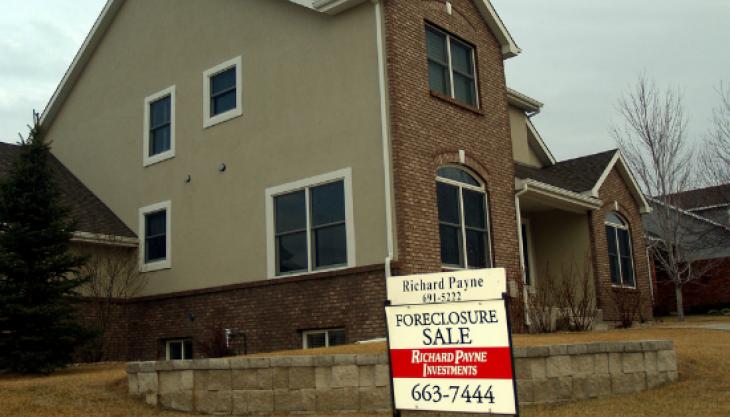Foreclosure or Bankruptcy - Which is Harder on Your Credit Score?
Submitted by Rachel R on Wed, 05/11/2016 - 10:20am

Credit score myths about foreclosure and bankruptcy
Image Source: Flickr CC User Davis Shankbone
Foreclosure and bankruptcy get a bad rap, but both can get you out of unaffordable debt. A research paper published by the Federal Reserve Bank of Cleveland debunks alarmist media stories that claim foreclosure results in triple digit credit score dips. Bankruptcy has a similar reputation for drastically lowering credit scores. Here’s some insight on how both these processes really work.
The First Missed Payment Is the Worst
In articles published between 2009 and 2010, The New York Times claimed that foreclosure dropped credit scores by “at least 100 points,” while Mint.com said foreclosure caused scores to “drop sharply, typically by 200 to 300 points.”
However, the Federal Reserve report came up with very different results. The Fed found that the first missed mortgage payment makes the biggest hit to consumer credit scores. Researchers found a 51-point dip in credit score when consumers move from current on their mortgage to 30-day delinquency.
From there, each subsequent delinquency has less of an impact. Transitioning from 30-day to 60-day delinquency represents a 25-point drop. Moving from 60-days to 90-days brings a 14-point decline – and from 90-days to foreclosure bring just six points of additional decline.
Foreclosure Has Less of a Lasting Impact Than Delinquency
So the first dip from current to 30-days delinquent represents as much of a drop as the other delinquencies plus foreclosure combined. Not only does the initial delinquency have a greater impact, it has a much longer-lasting impact.
The study showed that a 30-day delinquency continued to drag down credit scores a year later. Comparatively, within a year of a foreclosure, scores typically begin to rebound. In addition to misapprehensions about credit score dips, the study listed other reasons people mistakenly try to avoid foreclosure, including relocation costs and “moral and social considerations.”
Bankruptcy or Foreclosure Are Better Than Ongoing Past-Due Debt
Bankruptcy also represents an initial dip in your credit score. The higher your score, the greater the initial hit will be. But your score should rebound, particularly with Chapter 7. For both bankruptcy and foreclosure, the longer the amount of time since filing, the lesser the impact on your credit score.
What’s more impactful to your credit score is remaining in a state of perpetual delinquency and over-indebtedness. If your credit cards are maxed out, you often pay bills late, and you've missed even a single mortgage payment, your credit score is likely already suffering. Continuing on this way means lower scores for longer.
Getting Out of Debt Is the Best Thing for Your Credit Score
Both foreclosure and bankruptcy can actually improve your credit score in the long run compared to wallowing in debt you can’t manage. Within a few months of bankruptcy, you can start to improve your credit score by applying for secured credit cards and working your way up.
In some cases, going through foreclosure for a home with no equity, negative equity, or a loan you can't afford may be enough to get you back on the path to financial stability. However, foreclosure combined with bankruptcy may offer greater debt relief.
To find out more about rebuilding your credit score after bankruptcy, check out the great info at CreditScoreKeys.com. And to find out more about the debt relief that North Carolina bankruptcy offers, contact the Law Offices of John T. Orcutt. Call +1-833-627-0115 now for a free appointment in Raleigh, Durham, Fayetteville, Wilson, Greensboro or Wilmington.
Resources:
Debts Hurt! Got debt? Need help? Get started below!
Serving All of North Carolina
- Bankruptcy Attorneys Raleigh NC (North)
- Bankruptcy Attorney Fayetteville NC
- Bankruptcy Attorney Durham NC
- Bankruptcy Attorneys Wilson NC
- Bankruptcy Attorneys Greensboro NC
- Bankruptcy Attorneys Southport NC
- Bankruptcy Attorneys Wilmington NC
Bankruptcy Attorneys Raleigh NC (North)
6616 Six Forks Rd #203 Raleigh, NC 27615 North Carolina
Tel: (919) 847-9750

Bankruptcy Attorney Fayetteville NC
2711 Breezewood Ave Fayetteville, NC 28303 North Carolina
Tel: (910) 323-2972

Bankruptcy Attorney Durham NC
1738 Hillandale Rd Suite D Durham, NC 27705 North Carolina
Tel: (919) 286-1695


Bankruptcy Attorneys Greensboro NC
2100 W Cornwallis Dr. STE O Greensboro, NC 27408 North Carolina
Tel: (336) 542-5993

Bankruptcy Attorneys Southport NC
116 N Howe St. Suite A Southport, NC 28461 North Carolina
Tel: (910) 218-8682

Bankruptcy Attorneys Wilmington NC
116 N. Howe Street, Suite A Southport, NC 28461 North Carolina
Tel: (910) 447-2987
